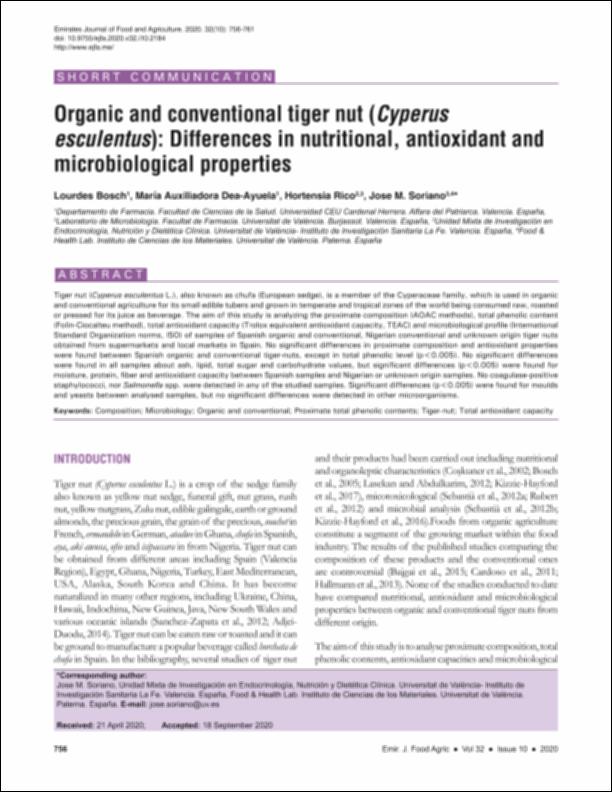Please use this identifier to cite or link to this item:
http://hdl.handle.net/10637/13238Organic and conventional tiger nut (Cyperus esculentus) : differences in nutritional, antioxidant and microbiological properties
| Title: | Organic and conventional tiger nut (Cyperus esculentus) : differences in nutritional, antioxidant and microbiological properties |
| Authors : | Bosch Juan, Lourdes Dea Ayuela, María Auxiliadora Rico Vidal, Hortensia Soriano del Castillo, José Miguel |
| Keywords: | Tiger-nut - Microbiology.; Plants, Edible - Properties.; Antioxidantes.; Antioxidants.; Chufa - Microbiología.; Chufa - Propiedades.; Tiger-nut - Properties.; Plantas comestibles - Propiedades. |
| Publisher: | United Arab Emirates University. |
| Citation: | Bosch, L., Dea-Ayuela, M.A., Rico, H. & Soriano, J.M. (2020). Organic and conventional tiger nut (Cyperus esculentus) : differences in nutritional, antioxidant and microbiological properties. Emirates Journal of Food and Agriculture, vol. 32, i. 10 (oct.), pp. 756-761. DOI: https://doi.org/10.9755/ejfa.2020.v32.i10.2184 |
| Abstract: | Tiger nut (Cyperus esculentus L.), also known as chufa (European sedge), is a member of the Cyperaceae family, which is used in organic and conventional agriculture for its small edible tubers and grown in temperate and tropical zones of the world being consumed raw, roasted or pressed for its juice as beverage. The aim of this study is analyzing the proximate composition (AOAC methods), total phenolic content (Folin-Ciocalteu method), total antioxidant capacity (Trolox equivalent antioxidant capacity, TEAC) and microbiological profile (International Standard Organization norms, ISO) of samples of Spanish organic and conventional, Nigerian conventional and unknown origin tiger nuts obtained from supermarkets and local markets in Spain. No significant differences in proximate composition and antioxidant properties were found between Spanish organic and conventional tiger-nuts, except in total phenolic level (p<0.005). No significant differences were found in all samples about ash, lipid, total sugar and carbohydrate values, but significant differences (p<0.005) were found for moisture, protein, fiber and antioxidant capacity between Spanish samples and Nigerian or unknown origin samples. No coagulase-positive staphylococci, nor Salmonella spp. were detected in any of the studied samples. Significant differences (p<0.005) were found for moulds and yeasts between analysed samples, but no significant differences were detected in other microorganisms. |
| Description: | Este artículo se encuentra disponible en la siguiente URL: https://www.ejfa.me/index.php/journal/article/view/2184 |
| URI: | http://hdl.handle.net/10637/13238 |
| Rights : | http://creativecommons.org/licenses/by/4.0/deed.es |
| ISSN: | 0023-6438 |
| Issue Date: | 1-Oct-2020 |
| Center : | Universidad Cardenal Herrera-CEU |
| Appears in Collections: | Dpto. Farmacia |
Items in DSpace are protected by copyright, with all rights reserved, unless otherwise indicated.


